Reviews for February 19th, 2010
The Last New Yorker
Directed by Harvey Wang.
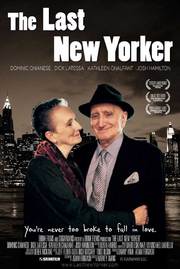
Lenny Sugarman (Dominic Chianese), a lonely man in his 70’s, lives all by himself in New York City and has never been married. His lifelong friend, Reuben Liebner (Dick Latessa), is stuck in an unhappy marriage. He and Lenny walk around the city complaining about how it has changed into a cold, alienating city throughout the years. One day, Lenny meets Mimi (Kathleen Chalfant), a very sweet woman around his age, on a public bus and follows her into a restaurant. After a very awkward, flirtatious conversation with her that shows his shyness and desperation when it comes to communicating with women, she lets him give her his number and promises to call him. He soon finds out from his nephew, Zach (Josh Hamilton), a stockbroker, that a bad stock investment has left him completely broke, so he decides to commit suicide in his apartment by hanging himself. Just when he’s about to tie the noose around his neck, he picks up a phone call from, just as you guessed it, Mimi, who agrees to meet him for dinner. Coffee has always been Lenny’s love of his life, but that’s about to change now that he’s met Mimi. Will Lenny find the confidence to build a meaningful romantic relationship with Mimi? What will it take for him to grow up and learn to how be honest with both himself and women? He seems much more comfortable around his friend Lenny and vice versa, so perhaps he doesn’t realize that something has been holding him back from being comfortable around women. Dominic Chianese and Kathleen Chalfant both give warm, charming performances, but unfortunately, the screenplay by Adam Forgash doesn’t provide you with enough backstory about Lenny’s life so that you’d be able to grasp what kind of trauma earlier in his life had led him to behave like such a desperate, jejune, quixotic and awkwardly shy man. Mimi seems exceptionally kind and even somewhat brave for putting up him to begin with. Moreover, his transformation into a swindler feels very inorganic and ludicrous. His feelings of comfort and ease whenever he’s with Reuben signifies that he’s meant to be more around men than women and, perhaps, that he has repressed homoerotic sentiments for whatever reason throughout his life---although, again, there’s not nearly enough information about Lenny’s past to buttress this mere speculation. Lenny and Mimi’s dates together would have been a perfect time for the audience to get to know them both, but even the character of Mimi never gets even a shred of a backstory either. On the other hand, the setting of New York City becomes a character of its own that breathes much-needed life into the film. The Last New Yorker ultimately manages to be a sweet, charming and warm romantic drama that suffers from being lazy, inorganic and seriously lacking in character development. The only scene-stealing, lively character is actually the city of New York itself. Number of times I checked my watch: 3 Released by Brink Films. Opens at the Quad Cinema. 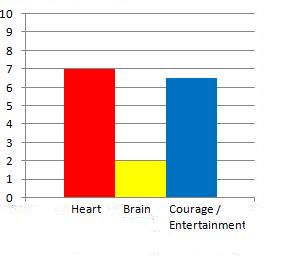
The Oscar-Nominated Short Films 2010
Directed by various directors.
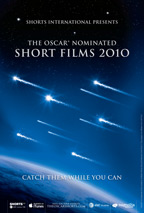
The live action short films include Kavi, written and directed by Gregg Helvey, about a young boy named Kavi (Sagar Salunke) who lives in a small village in India where he’s forced to work as a slave at a brick kiln instead of playing cricket and attending school like he wants to do. Helvey tackles a very important and timely issue about modern human slavery and films in a cinema verité style that might take you a while to feel immersed into Kavi’s plight and to care about whether or not he’ll escape from the kiln. From Germany comes The New Tenants, directed by Joachim Back, a dark comedy about two new tenants (Jamie Harrold and David Rakoff) who arrive at their apartment only to learn that the former tenant was a drug dealer. Little do they know that the flour that they found in the cupboard and kindly gave to a neighbor is actually heroin. The humor here is very Coen-esque and you’ll find many surprising, clever turn of events. From Ireland comes The Door, directed by Juanita Wilson, about a father (Igor Sigov) who poignantly recalls the feelings and thoughts he experienced during the aftermath of the 1985 Chernobyl disaster. The film is quite moving, tender and filled with a nice touch of lyricism and exquisite cinematography. In the short film Instead of Abracadabra from Sweden and directed by Patrik Eklund, Tomas (Simon J. Berger), a single man who still lives with his parents, works as a magician even though his father doesn’t quite approve of that line of work. It doesn’t help Tomas that one of his tricks of putting a sword through a box with a person in the middle of it has led to a tragic accident, among other tragic accidents from other magic tricks in the past. Now that his father’s 60th birthday is approaching, he prepares to be impress his parents once and for all with his magic tricks—as long as they go smoothly—and he might even win over a potential love interest in the process. This short is the funniest among the rest of the live action shorts, but it’s not particularly moving, insightful or exceptional beyond all those laughs. Finally, there’s the most witty, clever and poignant short, Miracle Fish from Australia and sensitively directed by Luke Doolan. Joe (Karl Beattie) has just turned 8 and has a tough time at school where he’s bullied and alienated without any friends. He falls asleep in school and wakes up to a slightly more sinister version of school with empty hallways and, soon enough, he encounters a mysterious madman with a gun. This film takes unexpected turns that keep you riveted and intrigued throughout its brief running time. The animated short films are each lively and imaginative in their own unique ways. In Granny O’Grimm’s Sleeping Beauty, from Ireland and directed by Nicky Phelan, a grandmother tells her granddaughter a very dark and twisted version of the “Sleeping Beauty” fairy tale that frightens her. In The Lady and the Reaper from Spain and directed by Javier Recio Gracia, an old lady desperately misses her husband and, one night, follows the grim reaper into the death world during her sleep so that she could meet her beloved husband. Meanwhile, a doctor attempts to bring her back to life. Little kids might be frightened by some of the imagery here, but there’s no denying that a lot of thought was put into the details of the animation from one fast-paced scene to another. From France comes French Roast, directed by Fabrice O. Joubert, a delightful, whimsical short about a businessman who dines at a café and, after learning that he lost his wallet, decides to order more and more coffee until the bill becomes very long. A serious of events changes luck, though, in amusing ways that won’t be spoiled here. Logorama, from France and directed by François Alaux, Herve de Crecy, and Luvodic Houplain, Ronald McDonald goes on the lam and ends up in a high-speed chase through a city while trying evade the police. It’s very fun and comical to observe all of the different uses of logos that pop up frequently while the vivid animated colors provide lots of eye candy. The most wickedly entertaining and brilliant short, though, is director Nick Park’s stop-motion animated A Matter of Loaf and Death from the UK. Wallace and Gromit co-own a bakery called Top Bun and a delivery service called Dough to Door. Wallace is head-over-heels in love with Piella Bakewell and, soon enough, he’s engaged to marry her, but it’s up to Gromit to find a way to convince him that she’s actually out to kill him. Piella’s adorable little poodle, Fluffy, comes along for the adventure as well and represents a potential love interested for Gromit. Park deftly balances action, comedy and drama without any dull or tedious moments. The comedy itself is filled from start to finish with sight gags and witty dialogue just like you would expect from a Wallace & Gromit story. Number of times I checked my watch: 2 Released by Magnolia Pictures. Opens at the IFC Center. 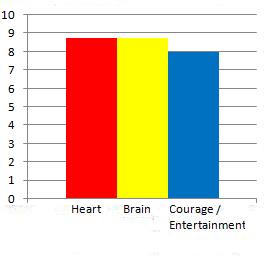
Phyllis and Harold
Directed by Cindy Klein.
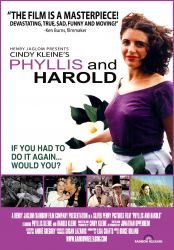
This revealing, well-edited, riveting documentary focuses on the troubled 59-year-old marriage of Phyllis and Harold Klein. What initially seems like an ordinary, bickering married couple gradually becomes more and more complex, surprising and heartbreaking as the secrets below the surface rise to the top. Their daughter, Cindy, grew up as a child being raised mostly by her family’s housekeep Annie McCarter, so she never really had the chance to bond with her parents until now. Cindy points the camera Phyllis and Harold and asks each of them to discuss how they met as well as how their marriage had evolved since then. The story of their crumbling marriage could easily be turned into a novel given all the events that took place, none of which will be spoiled here. Throughout the interviews with Cindy’s parents, you get the feeling that years and years of bottled emotions are coming out into the open. Not only are Phyllis and Harold revealing their past like they would in a diary, but they’re also experiencing a sort of therapy where they’re forced to confront their past. Phyllis’ past comes across as the most heartbreaking and fascinating because she’s a woman who’s trapped and suffocated by a domineering husband whom she has fallen out of love with, but yet she stays in that unhappy marriage for reasons that both Cindy and, you, the audience, discover as well. Cindy deftly combines interviews with Phyllis and Harold during their senescence with archival footage, photographs and nifty, witty animated sequences that help to enrich the story so that you wouldn’t be bored from listening to the talking heads. Had someone outside the family interviewed them, the interviews probably wouldn’t be as emotionally candid because they at least have developed a parent-child trust with Cindy that can’t be replicated by anyone else. It’s particularly moving to watch Phyllis and Harold read aloud the love letters that they had sent during their youth. Admittedly, though, Cindy could have omitted the footage of herself talking directly to the camera because it’s a bit distracting from the film’s momentum and somewhat awkward even though the impact of her parents’ marriage and behavior on her own life do matter. The effects of Phyllis and Harold’s bad parenting could easily be explored in a separate documentary that focuses on Cindy’s emotional journey and epiphanies rather than on those of Phyllis and Harold’s. Perhaps Cindy would have benefited from the insight of a psychologist who’d examine the mysteries of their marriage more thoroughly and professionally. At a running time of 1 hour and 24 minutes, Phyllis and Harold manages to be an endearing, suspenseful and well-edited documentary bursting with harsh truths about love, the vicissitudes of marriage and the innate struggles to find one's true happiness, identity and liberation. Number of times I checked my watch: 1 Released by Rainbow Releasing. Opens at the Cinema Village. 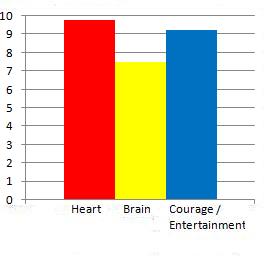
Shutter Island
Directed by Martin Scorcese.
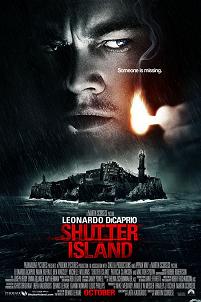
Based on the novel by Dennis Lehane. Two U.S. Marshals, Teddy Daniels (Leonardo DiCaprio) and Chuck Aule (Mark Ruffalo), arrive by ferry to Shutter Island, a remote island off the coast of Massachusetts. They’re sent to the Aschecliff Hospital on the island to investigate the mysterious disappearance of a mental patient, Rachel Solando (Emily Mortimer), who left behind a note underneath the tiles of her cell stating, “Who is 67?” and “The law of 4.” The more that Teddy and Chuck interview the inmates at the mental asylum, the more Teddy realizes that something strange and perhaps even sinister is taking place there involving Rachel’s disappearance. Dr. Cawley (Ben Kingsley), the chief psychiatrist who runs the asylum, calmly informs and assists Teddy throughout his investigation, but you can sense that Dr. Cawley might be hiding some kind of secret. Meanwhile, Teddy’s haunted by the memories of serving in World War II when went on a mission to rescue prisoners from a concentration camp. He also hasn’t overcome the death of his wife, Dolores (Michelle Williams), and his three kids. To explain the plot any further would some of its surprises. However, the screenplay by Laeta Kalogridis, has so many obvious red herrings, revealing clues and foreshadows that anyone who’s able to use logic and reason while processing information will be able to figure out the ending, which is meant to be jaw-dropping, but instead comes across as anti-climactic. A truly compelling and suspenseful mystery thriller ought to have an intelligent screenplay that can’t be easy to figure out and flows smoothly and organically even during its many twists and turns. All the red herrings, mindboggling twists seem gimmicky rather than clever and the flashbacks merely distract here, so you’ll ultimately feel nauseated and used like a Bangkok whore after the navy left port. Ben Kingsley, just as expected, adds gravitas to the film with his solid, engaging performance. DiCaprio also impresses with a sensitive performance as the increasingly paranoid Teddy. Patricia Clarkson briefly shows up as a former nurse in one of the film’s most captivating and well-written scenes. Unfortunately, well-written scenes like that are far and few between in Shutter Island because much of it is contrived and dumbed-down without enough subtleties, especially during a speech by Dr. Cawley near the end. Director Martin Scorcese at least includes impressive cinematography, costume design and set design to add to the eerie, foreboding atmosphere, but he could have easily cut down a few scenes that drag to keep the running time under 2 hours rather than overstaying its welcome at 2 hours and 18 minutes. Ultimately, Shutter Island manages to be an overlong, nauseating thriller lacking palpable suspense and clever twists which can’t be saved by its exquisite production values and solid performances. Number of times I checked my watch: 3 Released by Paramount Pictures. Opens nationwide. 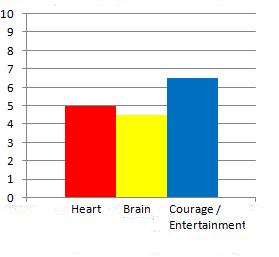
Main Page
Alphabetical Menu
Chronological Menu
______________________________________________________
|








